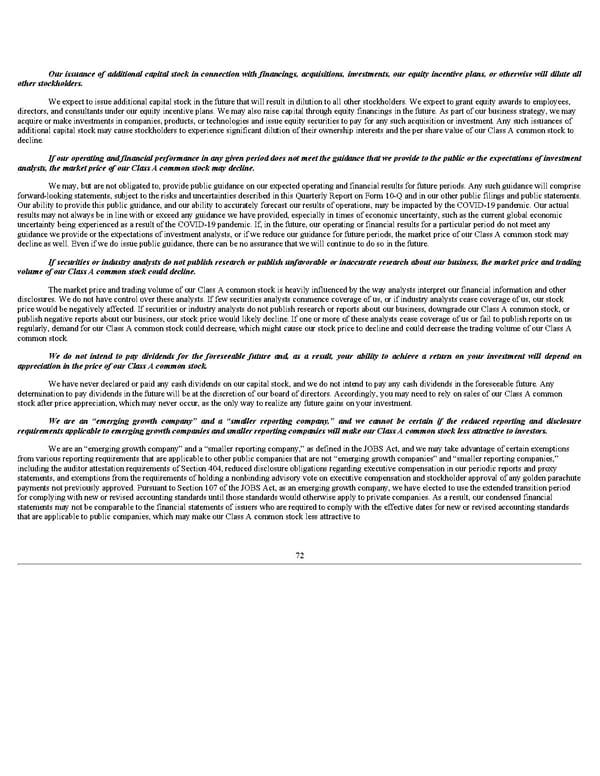Our issuance of additional capital stock in connection with financings, acquisitions, investments, our equity incentive plans, or otherwise will dilute all other stockholders. We expect to issue additional capital stock in the future that will result in dilution to all other stockholders. We expect to grant equity awards to employees, directors, and consultants under our equity incentive plans. We may also raise capital through equity financings in the future. As part of our business strategy, we may acquire or make investments in companies, products, or technologies and issue equity securities to pay for any such acquisition or investment. Any such issuances of additional capital stock may cause stockholders to experience significant dilution of their ownership interests and the per share value of our Class A common stock to decline. If our operating and financial performance in any given period does not meet the guidance that we provide to the public or the expectations of investment analysts, the market price of our Class A common stock may decline. We may, but are not obligated to, provide public guidance on our expected operating and financial results for future periods. Any such guidance will comprise forward-looking statements, subject to the risks and uncertainties described in this Quarterly Report on Form 10-Q and in our other public filings and public statements. Our ability to provide this public guidance, and our ability to accurately forecast our results of operations, may be impacted by the COVID-19 pandemic. Our actual results may not always be in line with or exceed any guidance we have provided, especially in times of economic uncertainty, such as the current global economic uncertainty being experienced as a result of the COVID-19 pandemic. If, in the future, our operating or financial results for a particular period do not meet any guidance we provide or the expectations of investment analysts, or if we reduce our guidance for future periods, the market price of our Class A common stock may decline as well. Even if we do issue public guidance, there can be no assurance that we will continue to do so in the future. If securities or industry analysts do not publish research or publish unfavorable or inaccurate research about our business, the market price and trading volume of our Class A common stock could decline. The market price and trading volume of our Class A common stock is heavily influenced by the way analysts interpret our financial information and other disclosures. We do not have control over these analysts. If few securities analysts commence coverage of us, or if industry analysts cease coverage of us, our stock price would be negatively affected. If securities or industry analysts do not publish research or reports about our business, downgrade our Class A common stock, or publish negative reports about our business, our stock price would likely decline. If one or more of these analysts cease coverage of us or fail to publish reports on us regularly, demand for our Class A common stock could decrease, which might cause our stock price to decline and could decrease the trading volume of our Class A common stock. We do not intend to pay dividends for the foreseeable future and, as a result, your ability to achieve a return on your investment will depend on appreciation in the price of our Class A common stock. We have never declared or paid any cash dividends on our capital stock, and we do not intend to pay any cash dividends in the foreseeable future. Any determination to pay dividends in the future will be at the discretion of our board of directors. Accordingly, you may need to rely on sales of our Class A common stock after price appreciation, which may never occur, as the only way to realize any future gains on your investment. We are an “emerging growth company” and a “smaller reporting company,” and we cannot be certain if the reduced reporting and disclosure requirements applicable to emerging growth companies and smaller reporting companies will make our Class A common stock less attractive to investors. We are an “emerging growth company” and a “smaller reporting company,” as defined in the JOBS Act, and we may take advantage of certain exemptions from various reporting requirements that are applicable to other public companies that are not “emerging growth companies” and “smaller reporting companies,” including the auditor attestation requirements of Section 404, reduced disclosure obligations regarding executive compensation in our periodic reports and proxy statements, and exemptions from the requirements of holding a nonbinding advisory vote on executive compensation and stockholder approval of any golden parachute payments not previously approved. Pursuant to Section 107 of the JOBS Act, as an emerging growth company, we have elected to use the extended transition period for complying with new or revised accounting standards until those standards would otherwise apply to private companies. As a result, our condensed financial statements may not be comparable to the financial statements of issuers who are required to comply with the effective dates for new or revised accounting standards that are applicable to public companies, which may make our Class A common stock less attractive to 72
 Q3 2021 10Q Page 77 Page 79
Q3 2021 10Q Page 77 Page 79